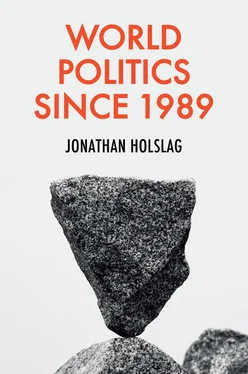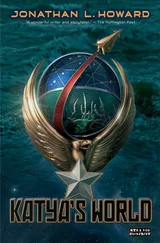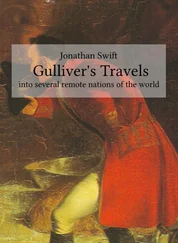But the pendulum swung back. In 2019, people protested again in the shadow of an imposing wall. It was pulled up along thousands of kilometers of border between the United States and Mexico. It was another milestone in world history, a turning point between a period of opening and a new period of fragmenting. The talk of the day was no longer about globalization but about de-globalization, about sovereignty, and autonomy. The United Kingdom decided to leave the European Union. In the United States, President Donald Trump railed against cosmopolitanism. Despite his turbulent term, two impeachment procedures, his blatant nationalism, his failure to address the devastating corona pandemic, and his rude style, Trump narrowly missed a second term during the elections of 2020. Many Americans continued to support him. The center of the global order, the champion of liberal values, the West itself, was cast adrift. Never had it been so fragmented.
All around, nationalism and authoritarianism were on the offense. In democratic India, Hindu-nationalist politicians exploited resentment against a minority of two hundred million Muslims. In South Africa, the legacy of freedom fighter Nelson Mandela was replaced by nationalism and xenophobia. If competition about territory was sometimes seen as trivial, Iraq invaded Kuwait, India clashed with Pakistan and China over Kashmir, Russia annexed Crimea, a strategically located peninsula in the Black Sea, and China went further and further in trying to control its adjacent seas. Numerous other territorial conflicts remained tense. The world moved from wall to wall.
In 2020, a worldwide outbreak of coronavirus accelerated this evolution. The World Health Organization became a battleground between China and the United States, until Washington ended its membership entirely. Highlighting the nationalist tendency, countries like Germany delayed exports of medical equipment. Instead of joining forces, the major powers unleashed a propaganda war. Exposing their increasing weakness, disaster management in countries like Italy and the United Kingdom turned out to be disastrous. In the United States, militia protested against national government measures to halt the virus. “Tyrants get the rope,” protesters yelled outside the capitol building of the State of Michigan. The coronavirus did not cause the decay of political order. It rather took hold of a political body that was in bad shape. Over one hundred armed groups vowed to fight the return of a Democrat to the White House, his alleged attempt to bring in communism, and his attempt to curtail gun ownership. The defeat of President Donald Trump in the elections made Trumpism more defiant.
The return of walls and nationalism cannot be reduced to isolated events, like the presidency of Donald Trump, the departure of the United Kingdom from the European Union, or the corona pandemic. The next chapters will provide evidence of a more fundamental fragmentation. At this point, it suffices to summarize that there was an increase in both economic globalization and democratization in the 1990s. In the following decade, between 2000 and 2009, economic globalization still advanced, but democratization stagnated. Between 2010 and 2020, economic globalization stagnated and democratization receded. At the same time, global military spending surpassed the Cold War record. The number of armed conflicts increased.
So, what happened? How was it lost? How was it lost, the flicker of hope that rude power politics was bound to make place for a benign world order? How could it be that the age of globalization bred so much nationalism? This question forms the point of departure for this book. The history of the period of globalization, the 30 years roughly between 1989 and 2020, is the story of a lost momentum. For all the growth, it was insufficient to overcome the gravity of power politics and localism.
One of the reasons was that the Western world held immense power, but often lacked wisdom: the wisdom to preserve social cohesion, the wisdom to use the historical wealth to build an attractive economic future, and the wisdom to use power with prudence on the global scene. It was as if those societies, after an arduous upward journey, a journey of toil and sacrifice, came to take their blessings for granted. They no longer had an idea about how to advance either, about what the next stage of development could be. A former South Korean minister once put it to me as follows. “I see the world as a mountain. Countries like mine and China are moving up,” he said. “But as we near the top, we see you having a picnic, consuming your wealth, unwilling to move to new heights, and being angry that others now move closer. You yield leadership and blame others for their ambition.” 7The three decades of relative peace in the West were a long-missed opportunity, a crisis of politics, diplomacy, and, in a way, civilization.
As so often in history, it is in a time of prosperity that we find the causes of decay. “They who are in the sinking scale do not easily come off from the habitual prejudices of superior wealth.” 8While the West fell short in preserving and reinventing the historical sources of its wealth, others harbored resentment and used shrewd statecraft to profit from its short-sightedness. What accounted for a lot of the trouble was indeed that the West complacently consumed its prosperity at the pinnacle of world politics, and for a long time ignored the challenges that built up. When it did wake up to the changes, the consequent nationalism made the situation worse. Nationalist remedies were about pretending strength and not about regaining strength. They did not call on citizens to take their responsibility, but put the responsibility on others. Western democracy became an incubator of demagogy.
There is no single explanation for this upsurge of nationalism and turbulence. It was not just the power shift from the West toward China that caused new uncertainty, nor was it just the failure of capitalism, or the inability to address common challenges, like climate change. Such a one-size-fits-all explanation would make this book perhaps more straightforward, allow it to be summarized in a captivating headline. But would that make us wiser? To understand change in world politics, it is imperative to consider a combination of elements. In fact, one of the things that stand out as a factor contributing to instability, is the failure of politics to deal with complexity, its proclivity for black and white. This book is about connections between different trends. But let us try, at the start, to put up some markers, to identify some themes that recur throughout the chapters.
A first such theme I title “Harmony contested.” We need to be cautious describing the period between 1989 and 2020 as a golden age. What looked like a golden age to some remained a challenging time to many others. Developing countries often saw globalization permitting consumers in North America and Europe to benefit from their resources and cheap labor. What the leading powers called just was considered abuse by others; what they considered harmony was a hierarchy. Many countries were dissatisfied, wanted to change that order, to catch up, to grow their own power, and become less dependent on the West. Disgruntlement also struck inside rich countries. After the turn of the century, many citizens in Europe and the United States saw their purchasing power stagnate, while the very rich at the top of their society flourished. In the United States, satisfaction about the state of the country declined. In the West and elsewhere, the frustration about cosmopolitanism had been brewing for years.
What most obviously caused the world to retreat into conflict positions was a profound power shift. This is the second theme. Power is the capacity to make others do what they otherwise would not have done. It is about possessing the economic, political, military, and moral weight to influence behavior. The West became the world’s center of power after the collapse of the Soviet Union. For a while, it was able to dictate the rules. Several countries wanted to be part of its orbit of influence, become members of the European Union, join the North Atlantic Treaty Organization (NATO), and participate in the international organizations it dominated. Slowly but surely, this position eroded. Externally, it prompted other powers to contest Western interests, led smaller countries to play the West off against new partners, and in its turn created a defensive backlash in Western capitals. Internally, the loss of power coincided with social distress and the waning of the legitimacy of center politics.
Читать дальше

![Деннис Лихэйн - Когда под ногами бездна [Since We Fell ru]](/books/25722/dennis-lihejn-kogda-pod-nogami-bezdna-since-we-fe-thumb.webp)










